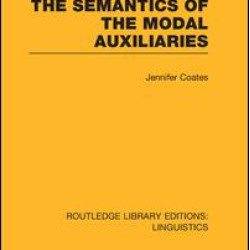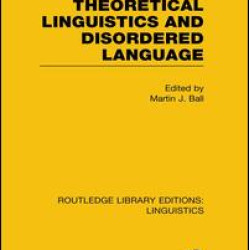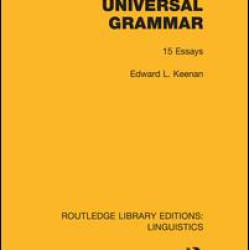Linguistics
Brand: Taylor & Francis
Model: Stock
The Routledge Handbook of Linguistics serves as an introduction and reference point to key areas in the field of linguistics. This handbook draws together a range of perspectives to provide a broad and comprehensive survey of the field. The 36 chapters, written by specialists from around the world, ..
₹13,953.60 ₹17,441.99
Brand: Taylor & Francis
Model: Stock
This book is a collection of linguistic and philosophical papers dealing with the semantic problems of determiners. The language under investigation is mostly English, although a few papers deal with French and German, and, to a lesser extent, with Dutch, Polish, Russian and Hebrew. The majority of ..
₹2,643.10 ₹3,303.88
Brand: Taylor & Francis
Model: Stock
The analysis of a corpus of a ‘real’ language brings the analyst face-to-face with a problem which has frequently been avoided or ignored in theoretical semantics: language is not an orderly phenomenon, and, as far as meaning is concerned, indeterminacy seems to be a feature of all languages. But it..
₹2,643.10 ₹3,303.88
Brand: Taylor & Francis
Model: Stock
The rapid increase of interest in disordered speech and language among linguists over the past decade or so has resulted in many books of practical help to speech pathologists in terms of assessment and remediation. Little, however, has appeared to examine the theoretical implications of the interac..
₹2,643.10 ₹3,303.88
Brand: Taylor & Francis
Model: Stock
This book focuses on two major traditions in the study of Modern English grammar: ‘old grammar’ in the Great Tradition of Sweet, Poutsma, Kruisinga, Curme, Jespersen and Quirk; and ‘new grammar’ in applications to Modern English of Chomskyan generative syntax. The purpose is to promote the study of ..
₹2,643.10 ₹3,303.88
Brand: Taylor & Francis
Model: Stock
This collection of 15 articles reflects Edward Keenan’s long-standing research interests in the comparative syntax of the languages of the world. It includes two seminal ‘foundation’ articles, Noun Phrase Accessibility and Universal Grammar (with Bernard Comrie) and Towards a Universal Definition of..
₹2,643.10 ₹3,303.88
Brand: Taylor & Francis
Model: Stock
Raymond Harris-Northall uses the distinctive features of generative phonology to present synchronic and diachronic rules, but exploits the evidence of the history of the Spanish sound system to show that the ‘simplicity’ required by the generativists often obscures rather than illuminates the way in..
₹2,643.10 ₹3,303.88








